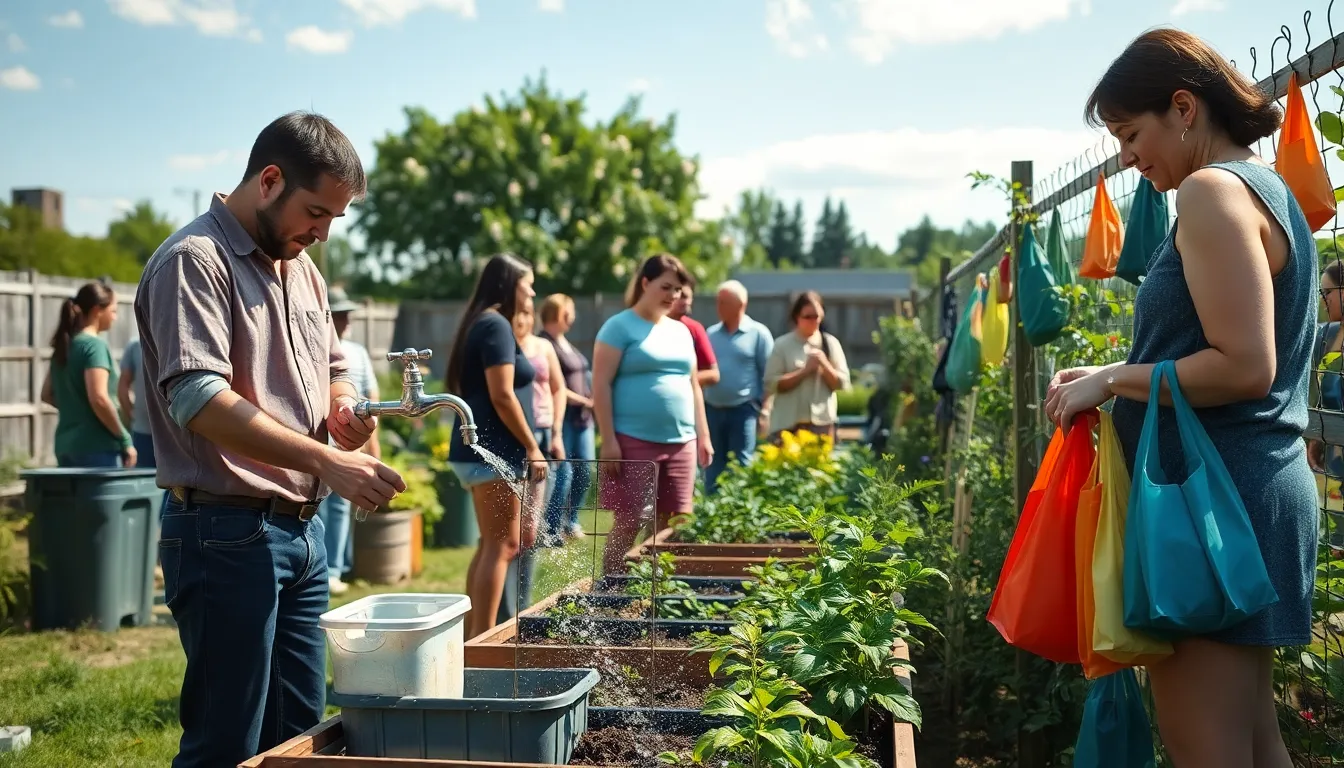Table of Contents
ToggleIn a world where plastic seems to outnumber people, embracing sustainable living isn’t just trendy; it’s essential. Imagine a life where your morning coffee doesn’t come with a side of guilt and your shopping habits don’t leave Mother Nature shaking her head. With a few simple tweaks, anyone can step into the eco-friendly arena and save the planet—one reusable straw at a time.
Benefits Of Sustainable Living
Sustainable living offers numerous benefits that impact both the environment and the economy positively. Adopting eco-friendly practices enhances overall quality of life and promotes a healthier planet.
Environmental Impact
Reducing carbon footprints contributes to lower greenhouse gas emissions. Protecting biodiversity becomes possible through strategies like composting and using native plants. Conserving water helps preserve critical resources for future generations. Overall, sustainable living practices significantly improve air and water quality. Minimizing waste reduces landfill overflow, resulting in less pollution and healthier ecosystems. Supporting renewable energy sources decreases dependence on fossil fuels and enhances energy independence. Climate change mitigation becomes achievable through a collective effort focused on sustainable practices.
Economic Advantages
Cutting energy costs can lead to significant savings for households and businesses. Investing in sustainable products often results in long-term financial benefits. The market for eco-friendly goods grows, creating opportunities for green jobs and innovation. Sustainability initiatives generally lead to improved community resilience and economic stability. Using fewer resources reduces expenses, offering a path to a more sustainable lifestyle. Consumers increasingly prefer brands committed to sustainability, boosting sales for eco-conscious businesses. Consequently, a shift to sustainable living not only supports environmental health but also fosters economic growth.
Practical Sustainable Living Tips

Adopting sustainable living practices benefits both the environment and the economy. Implementing specific actions leads to noticeable improvements in daily life.
Energy Efficiency
Being energy-efficient reduces greenhouse gas emissions. Upgrading to LED light bulbs lowers electricity consumption significantly. Utilizing smart thermostats optimizes heating and cooling, maintaining comfort while conserving energy. Disconnecting devices when not in use prevents phantom energy drain. Consider using energy-efficient appliances, as they consume less power over their lifespan. Regular maintenance of heating and cooling systems ensures optimal performance.
Water Conservation
Conserving water protects vital resources and supports ecosystems. Installing low-flow faucets and showerheads minimizes water usage without sacrificing comfort. Collecting rainwater for outdoor use promotes sustainable gardening practices. Watering plants during early morning or late evening reduces evaporation loss. Fixing leaks promptly prevents waste, conserving gallons over time. Utilizing mulch in gardens retains soil moisture and reduces the need for frequent watering.
Waste Reduction
Minimizing waste contributes to a healthier planet. Embracing a zero-waste lifestyle encourages the use of reusable bags, containers, and utensils. Composting organic waste enriches soil while diverting material from landfills. Prioritizing purchases from bulk bins reduces packaging waste. Additionally, recycling materials like paper, plastics, and metals helps conserve resources. Engaging in community clean-up events fosters a shared responsibility for the environment.
Sustainable Lifestyle Choices
Adopting a sustainable lifestyle encompasses various choices that encourage an eco-friendly impact. Individuals can implement practical methods to make more sustainable decisions in their daily lives.
Eco-Friendly Products
Choosing eco-friendly products significantly reduces environmental impact. Opt for biodegradable cleaning supplies that break down naturally and minimize pollution. Select reusable bags, which replace single-use plastic options, making shopping more sustainable. Prefer organic fabrics for clothing and home textiles, as they reduce chemical usage in production. Buy locally sourced food to lower carbon footprints associated with transportation and support local economies. Seek products with minimal packaging to avoid waste and decrease landfill contributions.
Sustainable Transportation
Sustainable transportation methods reshape daily commutes and long-distance travel. Public transit use, such as buses or trains, decreases reliance on personal vehicles and lowers greenhouse gas emissions. Carpooling with friends or coworkers not only saves fuel but also promotes social connections. Biking or walking short distances offers health benefits while reducing carbon output. Electric vehicles present another eco-friendly alternative, emitting fewer pollutants compared to traditional cars. Utilizing rideshare apps can help optimize journeys, allowing for reduced overall vehicle usage.
Community Involvement
Community involvement plays a pivotal role in promoting sustainable living practices. Engaging with others fosters a sense of collective responsibility toward the environment.
Local Initiatives
Participating in local initiatives strengthens community bonds. Volunteering for tree planting events helps combat urban heat and promotes biodiversity. Joining local clean-up efforts improves the safety and aesthetics of public spaces. Many communities organize farmer’s markets that support local agriculture while reducing carbon footprints from transportation. Attending workshops on sustainable practices can enhance knowledge and inspire others to adopt eco-friendly habits. Each action contributes significantly to a healthier, greener community.
Supporting Green Businesses
Supporting green businesses enhances local economies while championing sustainability. Buying from eco-friendly shops encourages ethical practices and reduces environmental harm. Many green businesses offer products that are biodegradable or sustainably sourced. Choosing sustainable services, such as eco-conscious cleaning or energy efficiency consulting, further reduces carbon footprints. Local businesses often prioritize community welfare, offering initiatives like recycling programs or educational events. Every purchase sends a message that sustainability matters, creating a shift toward eco-conscious consumer behavior.
Embracing sustainable living isn’t just a trend; it’s a vital step toward a healthier planet. By making mindful choices and adopting eco-friendly habits, individuals can create a ripple effect that benefits both the environment and local economies. Each small action contributes to a larger movement, fostering a sense of community and shared responsibility.
Encouragingly, as more people prioritize sustainability, businesses are adapting to meet this growing demand. This shift not only supports greener practices but also enhances the quality of life for everyone. Ultimately, the journey toward sustainability is a collective effort that promises a brighter future for generations to come.








